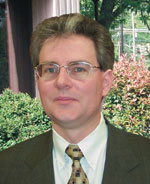 By Jim Borneman, Editor In Chief
By Jim Borneman, Editor In Chief
A common topic of conversation among U.S. textile executives is a shared concern about the development of future industry leaders. Often the question is focused on, “What can the industry do to attract bright young people of all stripes that will advance the industry into the future?”
This question affects existing companies but also the development of new companies chasing innovations and enhancing the definition of U.S. textiles.
This issue of Textile World features two articles that may help point to possible solutions.
One is the continuing developments at the Conover, N.C-based Manufacturing Solutions Center (MSC), part of Catawba Valley Community College. The MSC’s mission is captured in the article’s subhead: “The center’s Incubator Program is seeking entrepreneurs looking to realize their dreams.” The MSC assists new companies to manufacture product onsite with access to the MSC’s equipment, resources and services.
Companies including Nufabrx, InnovaKnits, Yu Apparel Corp. and Evolved by Nature, currently take advantage of the Incubator Program. Their stories are inspiring and illustrate how the MSC assists these start-ups in realizing their vision — offering pilot-scale manufacturing and providing necessary shared resources that would be out of reach for a typical start-up.
A new 75,000-square-foot facility was recently constructed adjacent to the current space —Manufacturing Solutions Center II — a partnership between the City of Conover, MSC, Catawba Valley Community College and private investment firm Whiskbroom. The additional space extends the opportunity to more entrepreneurs.
TW also spoke with Dr. Andre West, associate professor, and director of the Zeis Textiles Extension (ZTE) at Raleigh, N.C.-based NC State University’s Wilson College of Textiles, about the recently announced Flex Factory.
West explained that the Flex Factory is a two-phase project with phase one, “The Prototype Lab,” providing an environment for “students, researchers, start-ups and industry where ideation, innovation, collaboration with a focus on sustainable manufacturing can thrive.
“Phase II involves a complete space up fit and renovation to bridge our current Senior Design course space with the Flex Factory space and add additional features including a materials library and conference rooms.” Phase II is expected to be complete by the end of 2024.
The Flex Factory concept forges a strong link between textile students and the realities of industry and entrepreneurship.
West stated that there are fours things necessary for the Flex Factory’s success. First, assistance with acquiring the latest textile equipment – for the Flex Factory to be a “working showcase for cutting-edge equipment, especially equipment with a small footprint.”
Second, projects from industry are needed to challenge the students and faculty.
Third is funding to make Phase II happen at the university.
And lastly, industry engagement is encouraged because “ … seeing it first-hand with the machines running is the best way to understand the vision.”
MSC and the Flex Factory are both first-class examples of leadership development — honing new companies and students, soon to be the industry’s new blood, into catalysts of change enhancing the U.S. textile industry.
March/April 2023




